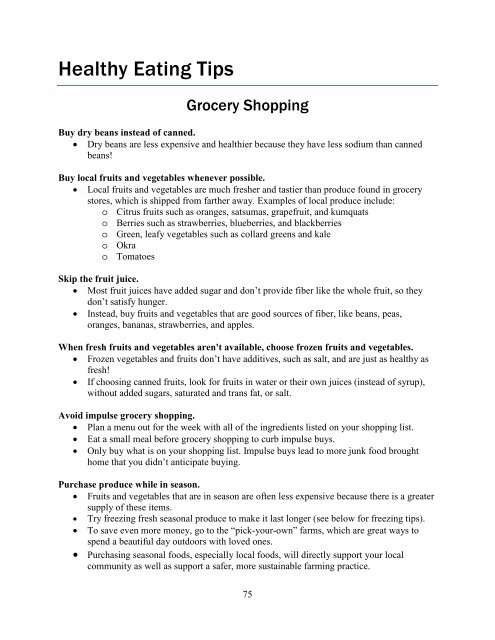You also want an ePaper? Increase the reach of your titles
YUMPU automatically turns print PDFs into web optimized ePapers that Google loves.
Healthy <strong>Eat</strong>ing Tips<br />
Grocery Shopping<br />
Buy dry beans instead of canned.<br />
• Dry beans are less expensive and healthier because they have less sodium than canned<br />
beans!<br />
Buy local fruits and vegetables whenever possible.<br />
• Local fruits and vegetables are much fresher and tastier than produce found in grocery<br />
stores, which is shipped from farther away. Examples of local produce include:<br />
o Citrus fruits such as oranges, satsumas, grapefruit, and kumquats<br />
o Berries such as strawberries, blueberries, and blackberries<br />
o Green, leafy vegetables such as collard greens and kale<br />
o Okra<br />
o Tomatoes<br />
Skip the fruit juice.<br />
• Most fruit juices have added sugar and don’t provide fiber like the whole fruit, so they<br />
don’t satisfy hunger.<br />
• Instead, buy fruits and vegetables that are good sources of fiber, like beans, peas,<br />
oranges, bananas, strawberries, and apples.<br />
When fresh fruits and vegetables aren't available, choose frozen fruits and vegetables.<br />
• Frozen vegetables and fruits don’t have additives, such as salt, and are just as healthy as<br />
fresh!<br />
• If choosing canned fruits, look for fruits in water or their own juices (instead of syrup),<br />
without added sugars, saturated and trans fat, or salt.<br />
Avoid impulse grocery shopping.<br />
• Plan a menu out for the week with all of the ingredients listed on your shopping list.<br />
• <strong>Eat</strong> a small meal before grocery shopping to curb impulse buys.<br />
• Only buy what is on your shopping list. Impulse buys lead to more junk food brought<br />
home that you didn’t anticipate buying.<br />
Purchase produce while in season.<br />
• Fruits and vegetables that are in season are often less expensive because there is a greater<br />
supply of these items.<br />
• Try freezing fresh seasonal produce to make it last longer (see below for freezing tips).<br />
• To save even more money, go to the “pick-your-own” farms, which are great ways to<br />
spend a beautiful day outdoors with loved ones.<br />
• Purchasing seasonal foods, especially local foods, will directly support your local<br />
community as well as support a safer, more sustainable farming practice.<br />
75


